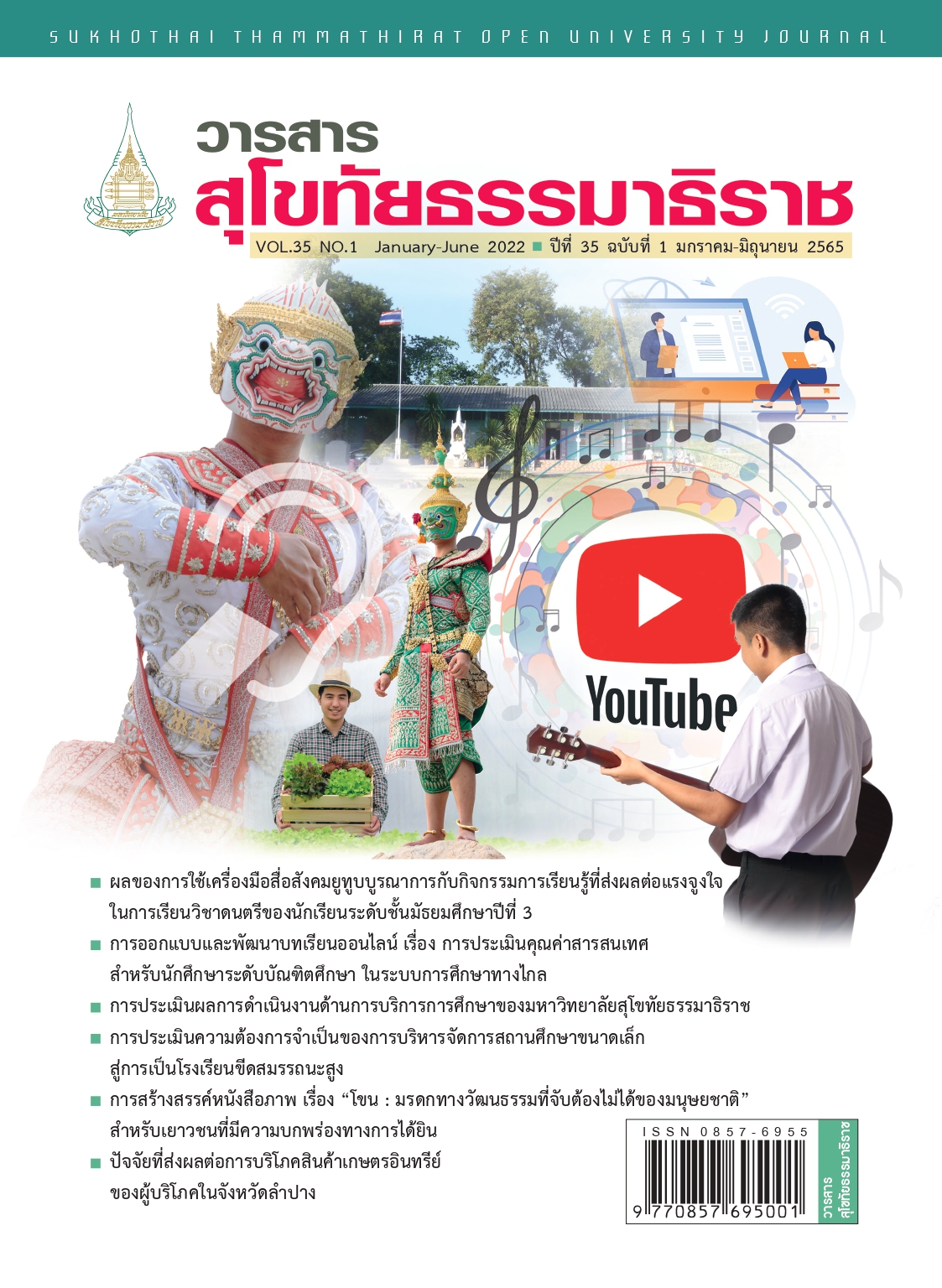ความต้องการและทัศนคติต่อสินค้าเกษตรอินทรีย์ของผู้บริโภคในจังหวัดลำปาง
คำสำคัญ:
ความต้องการ / การตัดสินใจซื้อสินค้าเกษตรอินทรีย์ /ทัศนคติ/ ผู้บริโภคบทคัดย่อ
งานวิจัยนี้มีวัตถุประสงค์เพื่อศึกษา1) ความรู้ ความเข้าใจเกี่ยวกับเกษตรอินทรีย์ 2) ทัศนคติต่อสินค้าเกษตรอินทรีย์ 3) ความต้องการสินค้าเกษตรอินทรีย์ 4) ความสัมพันธ์ของลักษณะทางประชากรของกับทัศนคติของผู้บริโภคที่มีต่อสินค้าเกษตรอินทรีย์ และ 5)ความสัมพันธ์ของทัศนคติต่อสินค้าเกษตรอินทรีย์กับความต้องการสินค้าเกษตรอินทรีย์ โดยใช้แบบสอบถามเป็นเครื่องมือในการสำรวจข้อมูลผู้บริโภคจำนวน 420 ตัวอย่าง ด้วยการสุ่มตามความสะดวกจากสถานที่สำคัญในอำเภอเมืองลำปาง วิเคราะห์ผลโดยสถิติ ร้อยละ ค่าเฉลี่ย ส่วนเบี่ยงเบนมาตรฐาน ค่าไคสแควร์ ค่าความแปรปรวนทางเดียว และค่าสัมประสิทธิ์สหสัมพันธ์แบบเพียร์สัน ผลการศึกษาพบว่าผู้บริโภคในจังหวัดลำปางกว่าร้อยละ 70 มีความรู้และความเข้าใจเกี่ยวกับเกษตรอินทรีย์เบื้องต้นเป็นอย่างดีและมีทัศนคติที่ดีต่อสินค้าเกษตรอินทรีย์ รวมทั้งมีความต้องการสินค้าเกษตรอินทรีย์ทุกประเภทโดยเฉพาะผักและผลไม้ อีกทั้งยังมีความเต็มใจจ่ายเพื่อซื้อสินค้าเกษตรอินทรีย์ในราคาที่สูงกว่าสินค้าปกติ อายุและรายได้มีความสัมพันธ์กับทัศนคติที่มีต่อสินค้าเกษตรอินทรีย์ในภาพรวม แต่ระดับการศึกษาไม่มีความสัมพันธ์กับทัศนคติของผู้บริโภค อีกทั้งยังพบว่าทัศนคติที่มีต่อสินค้าเกษตรอินทรีย์มีความสัมพันธ์กับความต้องการซื้อสินค้าเกษตรอินทรีย์อีกด้วย
เอกสารอ้างอิง
Aaker, D. A. (2009). Managing brand equity, New York: Simon and Schuster.
Bunyanuson, J. and Donkwa, K. (2017). The purchase demand for grains of organic rice products. NRRU Community Research Journal 11(2), 103-113. (In Thai)
Chakrabarti, S., & Baisya, R. K. (2007). Purchase Motivations and Attitudes of Organic Food Buyers. Decision (0304-0941), 34(1), 1–22.
Chryssochoidis, G. (2000). Repercussions of consumer confusion for late introduced differentiated products, European Journal of Marketing, 34 (5/6). 705-722.
Cochran, W.G. (1977). Sampling Techniques (3rd Ed.). New York: John Wiley & Sons.
Deliana, Y. (2012). Market segmentation for organic products in Bandung West Java, Indonesia. Res. J. Recent Sci., 1(3), 48-56.
Gracia, A.and DeMagistris, T. (2013). Organic food product purchase behaviour: A pilot study for urban consumers in the South of Italy. Spanish Journal of Agricultural Research, 5(4), 439-451.
Greennet. (2019). Organic products are sold in Thailand. Retrieved October 11, 2019, from Web site: https://www.greennet.or.th/2002-global-oa/ (in Thai)
Hill, H. and Lynchehaun, F. (2002). Organic milk: Attitudes and consumption patterns. British Food Journal, 104 (7), 526-542.
Jingchit, R. (2018). The future of Thai organic farmer: Dawn or Fall. Retrieved September 13, 2018, from Web site: http://www.tpso.moc.go.th/sites/default/files/1017-img.pdf (in Thai)
Johns, G. (1996). Organizational behaviour: Understanding and managing life at work (4th Ed.). Montreal: Harper Collins College Pub.
Kassarjian, H. H. (1971). Personality and consumer behaviour: A review. Journal of Marketing Research 8(4), 409-418.
Kongsom, W. and Kongsom, C. (2016). Consumer behaviour and knowledge on organic products in Thailand. International Journal of Economics and Management Engineering, 10(8), 2602-2606.
Kotler, P. and Armstrong, G. (2014). Principle of Marketing (15th Ed.). New Jersey: Pearson Education Inc.
Kozup, J. C., Creyer E. H. and Burton, S. (2003). Making healthful food choices: The influence of health claims and nutrition information on consumers' evaluations of packaged food products and restaurant menu items. Journal of Marketing 67(2), 19-34.
Mitchell, C.O., Rebecca J. S., and Chandukala, S. R. (2014). Green Claims and Message Frames: How Green New Products Change Brand Attitude. Journal of Marketing: September 2014, 78(5), 119-137.
Nilwanjanakul, K. and Kumpukka, P. (2013). Knowledge and attitudes influencing purchasing behaviour of green products of the consumer in Northeastern Region. Journal of Administrative Science 2(3), 65-83. (In Thai)
Panyakun, V. & Kongsom, C. (2015). Study and preparation of situation, production and marketing of organic products. Bangkok: Ministry of Commerce. (In Thai)
Paul, J., A. Modi and J. Patel (2016). Predicting green product consumption using the theory of planned behaviour and reasoned action. Journal of Retailing and Consumer Services, 29, 123-134.
Pino, G., Peluso, A. M., & Guido, G. (2012). Determinants of Regular and Occasional Consumers' Intentions to Buy Organic Food. Journal of Consumer Affairs, 46(1), 157-169.
Rana, J., and Paul, J. (2017). Consumer behaviour and purchase intention for organic food: A review and research agenda. Journal of Retailing and Consumer Services, 38, 157-165.
Rizwanalam, M. (2013). Branding Through Green Marketing: A Qualitative Approach. International. Journal of Sales & Marketing Management Research and Development (IJSMMRD) 3(1), 13- 20
Srimuenwai, A. (2010). Attitudes toward organic products of consumers in lower north-eastern region 1 (Master dissertation). The Suranaree University of Technology. Thailand. (In Thai)
Sukkarat, K. (2018). Study of attitude, behaviour, and involved factors of organic product consumers (Master of Science's Thesis). Thammasast University, Bangkok. (In Thai)
Tepwong, P. (2013). Perception and consumption behaviour on the pesticide-free vegetable of municipal school teachers in Khon Kaen Municipality, Khon Kaen Province. Journal of the Graduate School of Management Studies Khon Kaen University 6 (1), 41-52. (In Thai)
Van Loo, E. J., Diem, M. N. H., Pieniak, Z., & Verbeke, W. (2013). Consumer attitudes, knowledge, and consumption of organic yoghurt. Journal of Dairy Science, 96(4), 2118-2129.
ดาวน์โหลด
เผยแพร่แล้ว
เวอร์ชัน
- 2023-05-26 (2)
- 2022-11-01 (1)
รูปแบบการอ้างอิง
ฉบับ
ประเภทบทความ
สัญญาอนุญาต
ลิขสิทธิ์ (c) 2022 มหาวิทยาลัยสุโขทัยธรรมาธิราช

อนุญาตภายใต้เงื่อนไข Creative Commons Attribution-NonCommercial-NoDerivatives 4.0 International License.
บทความที่ได้รับการตีพิมพ์เป็นลิขสิทธิ์ของวารสารมหาวิทยาลัยสุโขทัยธรรมาธิราช
ข้อความที่ปรากฏในบทความแต่ละเรื่องในวารสารวิชาการเล่มนี้เป็นความคิดเห็นส่วนตัวของผู้เขียนแต่ละท่านไม่เกี่ยวข้องกับมหาวิทยาลัยสุโขทัยธรรมาธิราช และคณาจารย์ท่านอื่นๆในมหาวิทยาลัยฯ แต่อย่างใด ความรับผิดชอบองค์ประกอบทั้งหมดของบทความแต่ละเรื่องเป็นของผู้เขียนแต่ละท่าน หากมีความผิดพลาดใดๆ ผู้เขียนแต่ละท่านจะรับผิดชอบบทความของตนเองแต่ผู้เดียว
ห้ามนำข้อความทั้งหมด หรือบางส่วนไปพิมพ์ซ้ำ เว้นแต่จะได้รับอนุญาตจากกองบรรณาธิการวารสาร



